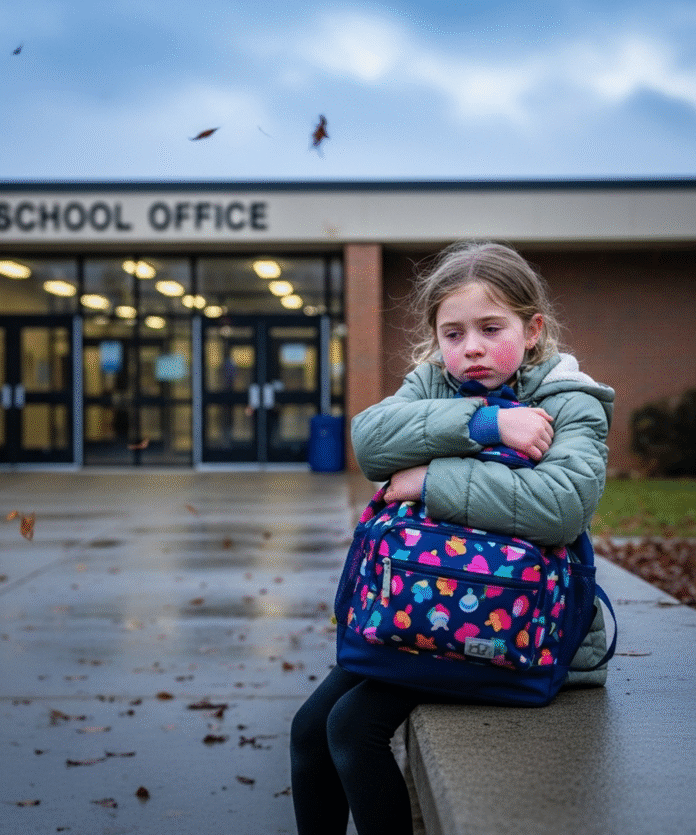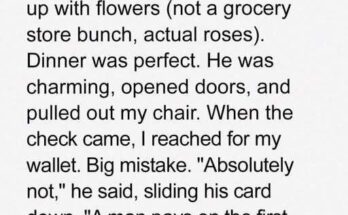At 1:32 p.m. on a gray February afternoon, my phone rang in the middle of a presentation that could change my career. The number flashing on my screen belonged to the school nurse.
“Marcus? It’s Lily,” she said gently. “Fever, chills, a little vomiting. She needs to go home.”
I stepped into the hallway, heart pounding, and did something I almost never do: I called my mother for help. She lived just ten minutes from Lily’s school.
“Mom,” I said, “Lily’s sick at school. I can’t leave until three. Could you please pick her up?”
There was a pause, a long one. Then her voice came through, cold and final.
“I’m not your babysitter.”
And then—click.
Not I can’t. Not I’m sorry. Just the sound of a door slamming on the one person I thought I could always count on.
The Bench Outside the Main Doors
By the time I reached the school, I was too late. The nurse had left for a medical appointment, and the office staff said they had “no space” for sick children.
I found Lily sitting on a concrete bench outside, her tiny body curled into her backpack for warmth. The February wind cut through her thin jacket. She didn’t cry when she saw me. She just whispered, “Can we go home now?”
That was the moment something inside me shifted.
I wasn’t just angry; I was gutted. This wasn’t about a favor refused—it was about a seven-year-old left out in the cold because the adults around her decided boundaries mattered more than kindness.
The Night of Listening
That evening, Lily lay feverish in her bed while I sat on the floor, listening to her shallow breathing. I brewed tea she wouldn’t drink and thought about every moment in my life when I’d chosen peace over confrontation. I had spent years absorbing my mother’s cutting remarks in silence. But this time, the wound wasn’t mine—it was my daughter’s.
And I realized: sometimes peace isn’t noble. Sometimes it’s just quiet surrender.
The Boundary That Said Nothing
I didn’t send my mother an angry text. I didn’t post a dramatic message. I just stopped answering.
Three days later, my phone filled with missed calls and messages from relatives: Call your mother. She’s upset. She didn’t mean it.
But I knew she did mean it. Her words were clear. My silence wasn’t revenge; it was a new kind of communication—one that finally had terms.
The Chance Encounter in Aisle 12
Two weeks later, Lily and I were in Target, comparing cupcake sprinkles. A familiar voice softened behind us.
“Lily? Honey, is that you?”
“Hi, Grandma,” Lily said politely, the way a child greets a stranger who knows their name. My mother crouched to hug her, but Lily didn’t move. She just held up a jar of rainbow sprinkles. “Dad, can we get these?”
My mother’s smile faltered. “Where are you going?”
“To Carol’s,” I said.
“My Carol?”
“Our Carol,” I replied. The realization flickered across her face: I had filled the gap she left with someone who showed up.
When she asked, “Can I come too?” I answered, calm and certain, “No. You’re not invited.”
That night, my voicemail overflowed with messages shifting from guilt to anger to tears. She wasn’t sorry about what she’d done. She was sorry she was now on the outside looking in.
The Paper That Proved Nothing
A week later, a thick envelope arrived. I had been removed as executor of my parents’ will. My cousin, the same one who once mocked Lily for crying over a popped balloon, was now in charge.
I laughed—just once, softly. It didn’t feel like punishment. It felt like release.
The Party They Crashed
For Lily’s seventh birthday, I rented a trampoline park. Pizza, laughter, raspberry cake—everything she loved. We didn’t invite my parents.
They came anyway, standing awkwardly by the door with a huge gift bag.
Lily leaned into me and whispered, “I don’t want to open it.”
“You don’t have to,” I said.
When my mother tried to hug her, Lily stepped behind me and waved instead.
“I hope you’re proud of what you’ve done,” my mother hissed.
“You showed up uninvited to a child’s birthday,” I said quietly. “And you’re upset she isn’t pretending everything’s fine.”
The Ice Storm
A few weeks later, an ice storm hit. Power lines cracked under frozen branches. Near midnight, a text from my father buzzed through:
Power’s out. Mom fell. Can’t get the car out. Can you come?
I typed one word: No.
It didn’t feel triumphant—it felt necessary. Boundaries mean that when someone repeatedly abandons you, their emergencies no longer erase your own needs.
The Weight of Silence
Days later, I passed their SUV on the shoulder of Route 6, hazard lights blinking over a flat tire. I didn’t stop. My hands gripped the steering wheel harder than they needed to.
Silence, I realized, doesn’t heal you. It just stops you from bleeding further.
The Picture on the Fridge
By April, Lily was drawing again—bright pink houses with stick figures labeled in her careful handwriting: Me, Dad, Nana Carol.
“Do I still have a grandma?” she asked one day, not accusing, just curious.
“You do,” I said gently. “Things are complicated.”
“Maybe she just forgot how to be nice,” she said.
She taped the picture to the fridge like a small prayer disguised as art.
The Text That Opened a Door
That night, I unblocked my mother’s number and typed a message:
Do you want to see Lily next Saturday? At the park. Short visit. No gifts. No drama.
Her reply came three minutes later: Yes.
The Swing That Didn’t Break
The next weekend was bright and crisp. My mother wore a wrist cast from her fall; my father hovered nearby, quiet and unsure.
Lily rode her scooter in wide circles, then stopped. “Grandma? Will you push me?”
My mother looked at me for permission. I nodded.
She pushed the swing gently—just enough to move the air, not enough to break the moment. No speeches. No apologies rehearsed for sympathy. Just a fragile thread of trust stretching between us.
Small Rules, Kept
At the school fundraiser weeks later, my parents stood in the back, clapped for Lily’s poem, and left quietly afterward. It was a small thing—but it mattered.
Two weeks later, Lily drew the same pink house again, this time with five stick figures: me, Lily, my parents, and Carol. Each one labeled carefully, equally. Healing, I learned, isn’t about erasing people. It’s about redrawing the lines so everyone fits safely.
What Boundaries Really Are
People often mistake boundaries for walls. They’re not. They’re blueprints. They show where the doors are, which windows stay open, and which beams hold the weight of the house you’re trying to build.
When my mother said, “I’m not your babysitter,” she told me exactly where her doors were. I finally believed her—and drew my own.
The Conversation Still Waiting
My mother now calls it “one bad moment.” I call it “the moment everything became clear.” The truth lies somewhere in between.
We don’t talk about forgiveness; we practice it quietly, through short visits, calm exits, and the unspoken agreement that love must be demonstrated, not declared.
The Real Meaning of Karma
Karma wasn’t me passing their car on the side of the road. Karma was refusing to let my daughter inherit the emotional debt I had spent my life repaying.
It looked like choosing safe people—like Carol—when the people with titles didn’t show up. And it looked like leaving the door open just enough for Lily’s sake, when she asked if one could be.
What I’ll Teach My Daughter
I’ll teach Lily that forgiveness is not a blank check—it’s a plan. It requires effort, boundaries, and proof. I’ll teach her that love can coexist with caution, that saying no can be an act of protection, and that courage sometimes looks like keeping the door open just a crack.
The Ending We Can Live With
We are not fixed; we are in motion. The cold days are behind us, and the sun, though cautious, has returned.
Some bridges collapse. Some burn. And some, miraculously, survive—charred but standing—because someone small and hopeful picks up a bucket of water and says, Let’s see what’s left.
I didn’t rebuild for my mother. I rebuilt for Lily—the little girl who wanted to swing in the park while her grandmother pushed, slowly and gently, exactly as far as trust could stretch.
And that, I’ve learned, is enough.



